“Stop killing women!” was the chant as thousands marched across Kenyan cities between January and February 2024. The demonstrations followed public outcry against increasing rates of femicide, murders that were mostly committed by intimate partners or persons known to the victims. Domestic violence often occurs when women challenge traditional gender roles or when men act out toxic ideals of masculinity enforced by society. This is demonstrated by the numerous cases of female athletes in Kenya murdered by their partners, possibly following attempts to challenge traditional gender structures. This systemic oppression, compounded with the failure of the state to respond effectively, has created a culture where violence against women is not only tolerated but, in many cases, normalized.
Historically, states have failed to effectively respond to domestic violence because it was mainly viewed as a “private matter.” Under common law, husbands had the right to physically punish their wives, reinforcing the conception of violence as acceptable. This institutional tolerance, coupled with deeply ingrained gender stereotypes around a woman’s role in society, has led to the institutionalization of systemic gender-based discrimination. Over time, these policies normalized the idea that women should be relegated to a subordinate status, further entrenching the impunity enjoyed by perpetrators of domestic violence.
When Kenyan women seek help, no one listens
Many victims of domestic violence receive little to no support through the formal criminal justice system. In Kenya, there have been attempts to enact laws and policies to keep women safe, such as the Protection Against Domestic Violence Act (PADVA), which offers survivors mechanisms like protection orders. However, significant gaps remain in both the legal and policy frameworks. Notably, PADVA provides only for civil relief and does not criminalize domestic violence, requiring reliance on other laws such as the Penal Code or the Sexual Offences Act, which do not explicitly define or address domestic violence comprehensively. Furthermore, the lack of a robust institutional and policy framework—including inadequate resource allocation, weak enforcement structures, and insufficient capacity within law enforcement and the judiciary—continues to hinder the effective implementation of these legal reforms.
Moreover, there are few effective protection and support mechanisms available for survivors. As a result, women may be forced to continue residing in the same home as their partners even after reporting them to the police. Some are also financially dependent on their abusers, a fact that highlights the painful calculations women must make when deciding whether reporting violence will make them safer.
In certain instances, police officers demand bribes to investigate and prosecute cases. Many officers are unaware of Kenya’s laws on gender-based violence (GBV), so survivors often aren’t informed about their rights or options after reporting. Law enforcement officials also struggle with inadequate resources, impeding their ability to investigate and prosecute cases effectively. Consequently, some of them place an unfair burden on survivors who report cases, for example, by requiring them to gather and preserve evidence themselves.
Developing a multi-sectoral approach to ending gender-based violence
When a state fails to act after a case of domestic violence is reported, it serves as a form of encouragement or de facto permission, indicating to society that violence against women is permissible. Therefore, it is imperative for the state to not only effectively respond to cases of domestic violence but also to establish measures to prevent it in the first place. Criminalizing all forms of violence against women through stand-alone legislation, for example, the Brazilian Maria De Penha Law or the adoption of mandatory arrest laws in the United States, ensures that police are obligated to make arrests in domestic violence disputes. Doing so reduces police discretion and communicates to the larger society that violence against women will not be tolerated, acting as a measure of deterrence.
However, this must also be accompanied by policy and institutional reform that will enable said laws to be implemented through capacity building and adequate budgetary allocations to different criminal justice agencies. Kenyans are still waiting for the prosecution of the majority of femicide cases, showing the low priority placed on GBV at large.
Nonetheless, some feminist scholars have advocated for a shift away from over-reliance on criminal law reform to address GBV, given how the criminal justice system fails to address the systemic nature of the violence. This narrow focus prevents the ability to challenge power dynamics that fuel domestic violence fully. As such, prevention must be seen as an equally vital pillar in efforts to end violence against women. States must ensure that prevention is maximized by seeking to solve the root cause of GBV at the community level.
For instance, organizations such as Raising Voices have pioneered community-level actions by engaging in conversations to shift unequal power relations between men and women in relationships. Other prevention initiatives have been structured around intervention measures that can be integrated into policies and legal measures, such as controlling alcohol and substance abuse, promoting comprehensive sexuality education, which can aid in breaking down deeply ingrained gendered norms, and adopting economic empowerment initiatives.
Lastly, an effective response to domestic violence must also include robust protections for survivors. County governments in Kenya provide opportunities for the state to enhance these provisions for all survivors. Here, all counties can dedicate a portion of their annual budgets specifically to support survivors of violence, such as through the construction of shelters, equipping GBV recovery centers, and offering economic empowerment initiatives for all women.
It is time to end the culture of impunity around gender-based violence
Social norms promoting gender stereotypes and the overwhelming failure of governments to respond to violence against women have together created a culture of impunity and a femicide epidemic worldwide, including in Kenya. States must treat domestic violence as a precursor to femicide and strengthen efforts to prevent and respond to such violence through a multi-sectoral approach. Until the state acts, women will keep marching—not just for justice, but for the right to stay alive.

